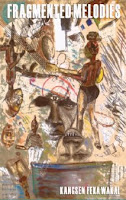Ngome, V.E. (1992), What God Has Put Asunder. Yaounde: Pitcher Books. Ltd.We will begin our analysis of the Cameroonian plays with Victor Epie Ngome’s What God Has Put Asunder. At a literal level, it is the story of Weka, a child brought up in an orphanage under Rev. Gordon and Sister Sabeth. When Weka reaches nubile age, two suitors ask her hand in marriage: one of them is Mr. Miche Garba, and the other Mr. Emeka who grew up in the orphanage together with Weka. Despite Emeka’s solid claims over Weka as a childhood friend, Mr. Garba has his way, but Weka accepts him reluctantly.
Their marriage is solemnised by Rev. Unor, probationally, without the matrimonial rings. The couple will live together and study each other for ten years at the end of which period if they still desire to be husband and wife, then the official ceremonies of the wedding will be conducted. But during the probational period Weka discovers that Miche Garba is no good. He maltreats and neglects her. He exploits the rich cocoa farms left by her father and squanders the money on his concubines. He does not tolerate Weka’s questioning attitude.
When she can no longer stand Garba, Weka escapes with her children back to her father’s compound to rebuild his dilapidated house and their shattered lives. Garba pursues her there threatening to forcefully take them back to his house. Once more the matter is brought to the court to take a decision on. And the court’s decision is that the couple will live in physical separation although united in a ‘simulated wedlock’, and that the marriage remains subject to the confirmation by husband and wife only, to the exclusion of any other parties; that the marriage will become null and void once any of the two parties objects to it; that until the confirmation is carried out under the supervision of the court, the couple will continue to live under physical separation but to show decency and decorum towards each other in order to avoid an unfortunate intervention by the court. Here is part of the court’s declaration:
And finally, given that, the final confirmation of the marriage following the compatibility test, voices other than that of the concerned party were enlisted, and that these voices influenced the outcome of the consultation; the court decides as follows:
One, that the marriage remains subject to confirmation between husband and wife — on a one-to-one basis , and to the total exclusion of all other parties. It shall become void once any one of the two partied concerned objects thereto. (Ngome: 1992 58)
The main theme emerging from the play is the incompability of the couple Garba and Weka. Theirs is an uneasy union: at best it is a precarious marriage; at worst, an unworkable one. Weka cannot put up with Garba’s philosophy and philandering life style. The other theme is economic exploitation. Garba seems to have married Weka largely out of economic interest. For he takes over and exploits the cocoa farms left by Weka’s father, deriving enormous wealth from them without ploughing back some of the profit to develop the farms. At another level of economic exploitation, we find Garba feeding fat on the wealth of the cooperative society, the wealth of the nation. He is the unconscionable General Director of the Cooperative Society. With cheques to this or that girl, with mounting hotel bills to settle in support of his sensual lifestyle, Garba dips his hands into the cooperative funds with reckless abandon, eventually draining them dry of cash.
But within the Cameroonian context the play and its themes have a greater symbolic significance. For instance, the marriage metaphor relates to the political union of Anglophone Cameroon and its Francophone counterpart. Hence, Weka stands for the former Southern Cameroons, and Garba for La République du Cameroun. Weka’s parents represent the British government that relinquished responsibility over Southern Cameroons; Rev. Geodon and the orphanage stand for the U.N. trusteeship mandate over Southern Cameroons; the Louis mentioned in the play is France; Emerka is Nigeria, etc. Garba’s neglectful but exploitative attitude towards Weka represents the attitude of the Francophone leadership towards Anglophones in present day Cameroon, a behaviour that has come to represent the central grievance in what Anglophone Cameroonians have identified as the “Anglophone Problem in Cameroon.”
Now if one transfers the literal themes discussed above to the symbolic level, they will constitute an important aspect of the Anglophone problem. The ultimate social relevance of What God Has Put Asunder to the Anglophone Cameroonian community lies in the fact it has contributed in no small way to the overall education of the Anglophones. Of course, it may be too much of a claim to suggest that the present state of the critical consciousness of the Anglophone Cameroonians is the work of a single play alone. The play is only one part, albeit an important part, of a large process that came in with the limited freedom of the press.
Culled from
Cameroonian and Kenyan Writers in Politics by Shadrach A. AMBANASOM
 Dorothy A. Atabong’s debut novel, THE PRINCESS OF KAYA is a unique and daring triumph. A large cast of 36 mobile characters of African decent drive this novel. With a complex action-packed and fast-paced plot, it is a wonderful journey into a strict society of West African culture and traditions.
Dorothy A. Atabong’s debut novel, THE PRINCESS OF KAYA is a unique and daring triumph. A large cast of 36 mobile characters of African decent drive this novel. With a complex action-packed and fast-paced plot, it is a wonderful journey into a strict society of West African culture and traditions.



















